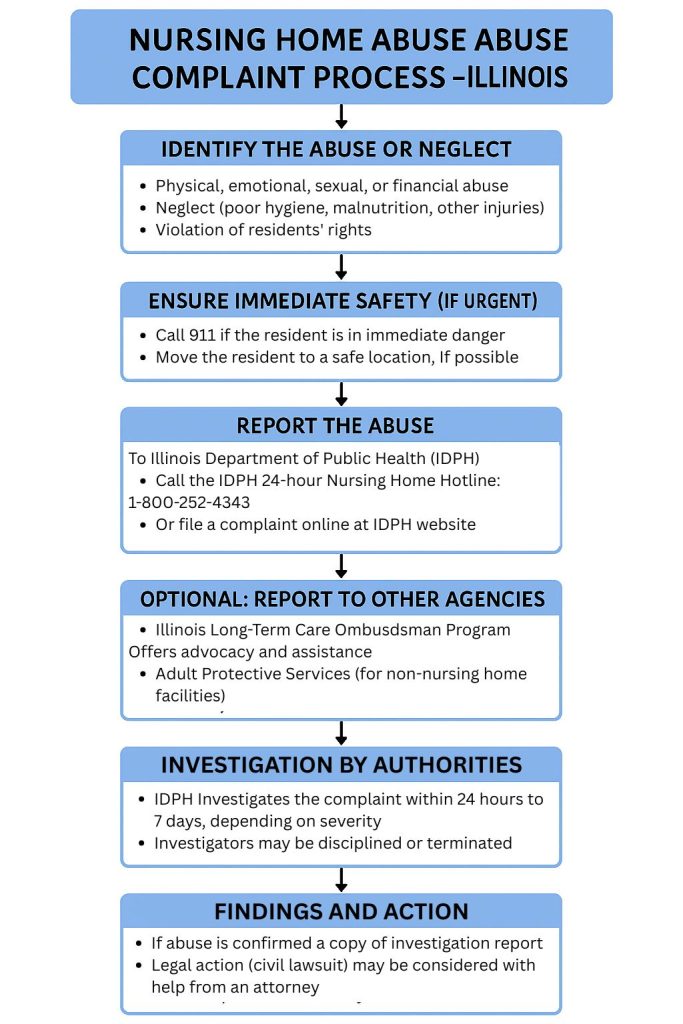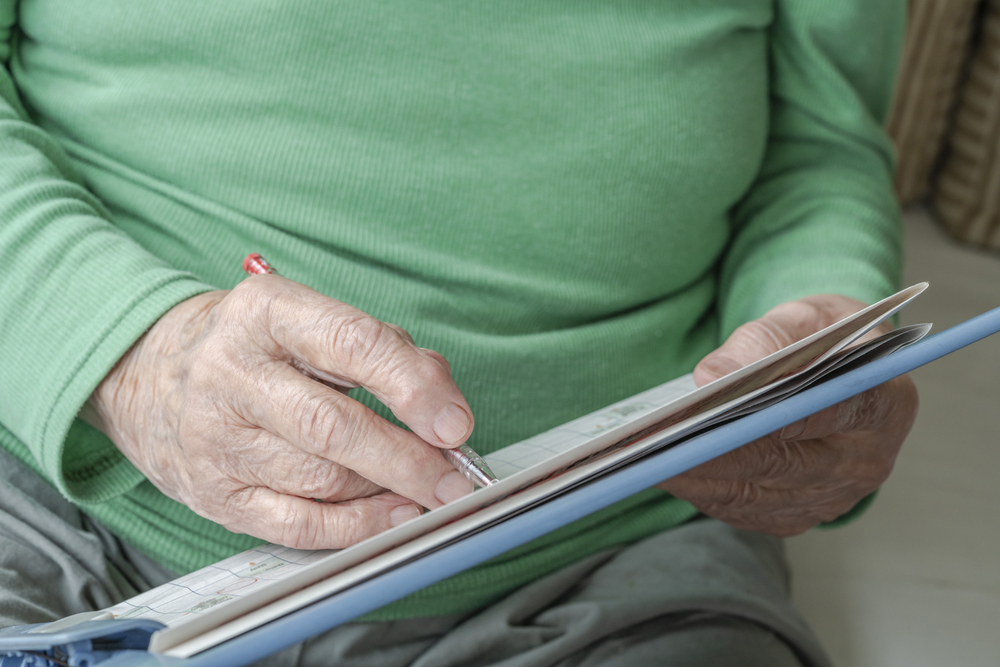How to Report Nursing Home Abuse in Illinois

Our Chicago nursing home abuse lawyer team will walk you through how to report nursing home abuse in Illinois, including the proper authorities to contact, how to document your concerns, and what steps to take next.
Nursing home abuse in Illinois remains a serious and widespread issue affecting elderly residents in long-term care.
From physical to financial abuse and neglect, many forms of mistreatment continue to threaten the safety and dignity of Illinois nursing home residents. Sadly, abuse often goes unnoticed or unreported until significant harm has already occurred.
If you suspect a loved one is being mistreated in a nursing facility, it’s essential to report suspected abuse right away. Reporting helps protect the alleged victim and may prevent further harm to others. It also holds the facility and its staff members accountable under Illinois law.
How to Report Elder Abuse or Neglect in a Nursing Facility in Illinois
If you suspect abuse or neglect in an Illinois nursing home, acting quickly can make a significant difference in protecting an elderly loved one.
Illinois law (210 ILCS 30/4) under the Abused and Neglected Long Term Care Facility Residents Reporting Act allows anyone—family members, staff, visitors, or concerned citizens—to report suspected abuse. Whether the concern involves physical abuse, financial exploitation, neglect, or other forms of mistreatment, there are official agencies equipped to investigate.
The Illinois Department of Public Health (IDPH) handles nursing home and supportive living facility complaints. For elderly individuals living in community settings or receiving home health services, reports go through the Illinois Department on Aging.
Below is a step-by-step guide to help you report nursing home abuse in Illinois through the appropriate channels. Each agency offers hotlines, online forms, and local office support. Filing a report is confidential, and you do not need to prove the abuse occurred—reasonable suspicion is enough to take action and trigger an investigation.
Reporting Abuse and Neglect Through the Long-Term Care Ombudsman Program
The Long-Term Care Ombudsman Program, operated under the Illinois Department on Aging, plays a key role in protecting the rights of nursing home residents.
Ombudsmen serve as advocates for elderly residents in licensed nursing homes, supportive living facilities, and other long-term care settings. Their primary role is to ensure residents are treated with dignity and are free from abuse, neglect, and exploitation.
If you report suspected abuse through the Ombudsman Program, an ombudsman can investigate the complaint, speak directly with the resident, review facility practices, and work to resolve concerns with staff or administrators. They are trained to identify abuse and neglect, including abuse, poor medical care, or violations of resident rights under Illinois law.
To contact your local ombudsman, call the Senior Helpline at 1-800-252-8966 or visit the Illinois Department on Aging’s website. All complaints are confidential, and the program can assist both residents and family members who need help reporting abuse or addressing unsafe conditions.
Filing Nursing Home Complaints with the Illinois Department of Public Health
IDPH is responsible for investigating licensed nursing home and supportive living facility complaints of abuse, neglect, and substandard care across the state.
When someone files a complaint, IDPH may initiate an unannounced inspection, review medical records, interview staff and residents, and assess whether the facility violated state or federal regulations. If violations are found, the department can impose penalties, require corrective action plans, or refer cases for civil or criminal liability.
To report nursing home abuse directly to IDPH, contact the Central Complaint Registry at 1-800-252-4343. You can also file a complaint online by visiting the IDPH Nursing Home Complaint Form.
You do not need proof to file—reasonable suspicion is enough. Complaints can be made anonymously and should include the facility name, the alleged victim’s name, the alleged abuser’s name (if known), and a description of the suspected abuse or neglect.
The Role of the Illinois Department of Aging in Community-Based Abuse Reports
The Illinois Department on Aging oversees the Adult Protective Services (APS) Program, which investigates reports of abuse and neglect involving seniors living in private homes, unlicensed settings, supportive living program facilities, and through home health agencies.
APS focuses on protecting elderly residents and adults with disabilities who are at risk of abuse, neglect, or financial exploitation outside of licensed nursing homes.
When a report is made, a trained case worker will be assigned to assess the situation, speak with the alleged victim, and take steps to ensure their safety. APS can coordinate medical care, initiate legal protections like a court order, or connect families with needed services.
To report suspected abuse in a community-based setting, call the Illinois Senior HelpLine at 1-800-252-8966 or file a report online through the Illinois Department on Aging’s APS Portal.
Timely reports help protect vulnerable seniors and ensure abusers are held accountable under Illinois law.
Choosing Which Agency to Contact
Understanding which agency handles different types of abuse reports is essential for taking the right action. In Illinois, jurisdiction depends on where the suspected abuse occurs and the type of facility involved.
IDPH investigates abuse, neglect, and unsafe conditions in licensed nursing homes, supportive living facilities, and skilled nursing facilities. If the alleged abuse involves a licensed facility, IDPH is the proper authority to contact.
The Illinois Department on Aging (IDoA), through its Adult Protective Services (APS) program, handles reports of abuse involving seniors living in private homes, unlicensed settings, or receiving home health care.
The Long-Term Care Ombudsman Program advocates for residents living in licensed long-term care facilities. While they don’t enforce penalties, they work directly with residents to resolve complaints and ensure their rights are protected.
Knowing where to report nursing home abuse in Illinois ensures the appropriate agency can step in quickly to protect the alleged victim and investigate the complaint.
Mandatory Reporting Laws in Illinois
Under the Illinois Adult Protective Services Act (320 ILCS 20), certain professionals are legally required to report suspected elder abuse. This includes doctors, nurses, social workers, law enforcement officers, home health providers, clergy, and other individuals who work closely with elderly residents.
If any of these professionals suspect abuse or neglect, they must report it to the proper authorities—typically the IDoA Adult Protective Services or the IDPH, depending on the setting.
Failure to report suspected abuse as required by law can result in penalties, including professional disciplinary action and, in some cases, criminal liability.
The Illinois Nursing Home Care Act further protects residents in licensed facilities. It allows residents to sue facilities for abuse, neglect, or failure to provide proper care.

What Happens After You File a Report
Once you report nursing home abuse in Illinois, the agency receiving the complaint begins with an intake process—gathering details such as the alleged victim’s name, the alleged abuser’s name (if known), the type of abuse, and the facility or setting involved.
You do not need proof of abuse to file a report; reasonable suspicion is enough. Reports can be made confidentially or anonymously, especially if you’re concerned about retaliation.
After intake, the agency assigns an investigator or case worker. Timelines vary depending on the urgency, but high-risk cases involving physical abuse, sexual assault, or neglect typically receive immediate attention. Investigators may interview the resident, review medical records, and speak with staff.
While the agency may not provide detailed updates due to privacy laws, they may confirm whether an investigation was opened. The alleged victim and their family have the right to be protected, informed, and—if appropriate—referred for further services or legal assistance.
Recognizing the Warning Signs of Abuse and Negligence
Elder abuse can present in many forms, and recognizing the warning signs is critical to protecting Illinois nursing home residents. Some signs are visible, while others appear as changes in behavior or emotional well-being.
Physical abuse may involve unexplained bruises, broken bones, lacerations, or bedsores, especially when staff fail to reposition residents. Repeated injuries or frequent hospital visits may also indicate a pattern of harm.
Emotional abuse often appears as depression, fearfulness, nervousness around staff members, or social withdrawal.
Neglect may show through poor hygiene, dirty clothing or bedding, weight loss, dehydration, or untreated medical conditions—clear indicators of negligence.
Sexual abuse can include signs such as bruising, infections, anxiety, or sudden behavioral changes.
Financial exploitation may involve missing personal items, unexplained charges, or confusion about banking activity.
Many Illinois nursing homes with serious violations show repeated failures to prevent these forms of abuse.

Consult an Illinois Nursing Home Abuse & Neglect Lawyer
If your loved one has suffered abuse, neglect, or mistreatment in an Illinois nursing home, taking legal action can help protect their rights and prevent further harm. An experienced elder abuse attorney in Chicago can guide you through the process of reporting abuse, investigating the facility, and holding those responsible accountable under Illinois law.
Whether the case involves physical abuse, neglect, financial exploitation, or other forms of mistreatment, legal support can make all the difference.
At Nursing Home Law Center, we represent families throughout Illinois in cases involving nursing home negligence and elder abuse. We offer free consultations, and there are no upfront fees—we only get paid if we recover compensation on your behalf.
Our attorneys have recovered over $450 million for families nationwide and are ready to help you pursue justice for your elderly loved one.To speak with a lawyer today, call us at (800) 926–7565 or fill out our contact form to schedule your free, confidential case review.

